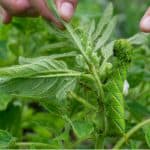Last updated on April 23rd, 2022
Our site is reader supported, this means we may earn a small commission from Amazon and other affiliates when you buy through links on our site.
If you grow broad beans on a regular basis then you know to be on the lookout for many pests and diseases, with one of the most common being blackflies. Blackflies are problematic because they not only weaken your plants but it leaves them subsequently susceptible to infections. Thankfully, controlling blackfly on broad beans is not as hard as it might seem.
What is Blackfly?
Blackflies are small aphids that attack your broad beans, suck the sap from them, and leave them weakened and compromised. The problem comes when the blackflies suck out more sap than they can eat and leave in its place a sugary substance called honeydew. This is effectively waste, but it is also food for ants. So, blackflies give ants a source of food while also eating away at your plants. This can easily spread infections or diseases on the plants too.
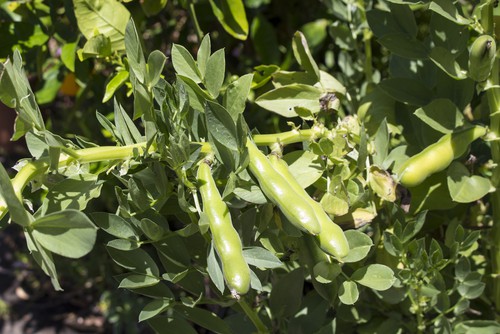
Removing the Ant Party
As blackflies attract ants in large groups, you can help protect your beans against this secondary invader by spreading a ring around the base of petroleum jelly. Place a ring (at the base) that is about 50-80mm thick and this will prevent the ants from climbing around your plants.
You want to do this first because the ants will work hard to defend their food source, and that means defending the blackfly. So if you eradicate the ants first, you can then eradicate the blackfly without any ants coming to their aid.
- Hugo just different is a fragrance full of surprise
- It will revitalize your deepest senses
- An aromatic woody fragrance for men
- It is perfect for a casual or a sporty event
- Good quality of product
Prevention is Key
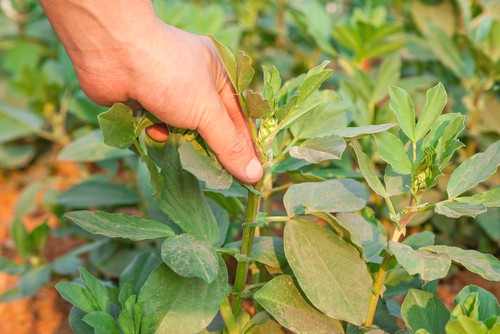
Don’t over fertilise them and pinch off the new young growth
Prevention is the most important thing here, preparing good soil with compost in which to sow your beans. Adding extra ingredients can give your beans the nutrients they need to survive. Don’t over fertilise when you plant them because this can leave the broad bean weakened, and more susceptible to damage from blackflies.
As your plants grow, pinch off the young, green leaves and tips so that the plant focuses its energy on flowering. This will help prevent the blackfly too because they often eat the younger parts of the plant.
Plant companion plants
You can plant companion plants so that pests like blackflies leave your broad beans alone and head over to the other plants. Of course, here, you are offering the other plants as a sacrifice of sorts.
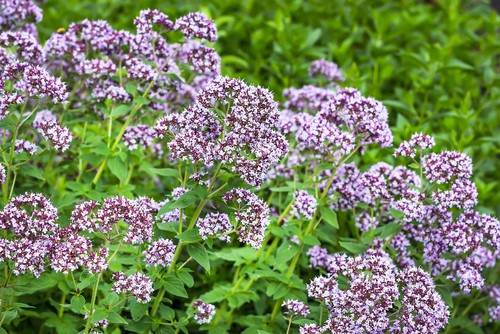
- Oregano is a very fragrant herb that will provide blackflies with better food than your beans, and attracts beneficial insects too.
- Dill is another herb that can be grown in the company of your broad beans. It will not only lure away the blackfly but other aphids too.
- Cosmos are beautiful with wide flowers and feathery leaves, but what’s more exciting, is how well cosmos attract blackflies, aphids and beneficial insects so your broad beans can be left in peace.
- Buckwheat (often grown for the cereal) is a relative of rhubarb and attracts the blackfly, as well as butterflies and bees.
- Poached Egg, a plant called this because the flowers look like poached eggs, will self-seed with just one plant, so you can watch as its flowers attract beneficial insects and lure away the blackfly.
- Top Quality 9cm Herb Plants Lincolnshire grown.
- Seasonal Selection Of Top Quality Lincolnshire Grown Herbs
- All These Herbs Are Perfect For The keen Gardener Or Cook
- Perfect To Start Or Expand Your Herb Garden
- Selection may vary with seasonal availability.
Getting Rid of Blackfly Infestations
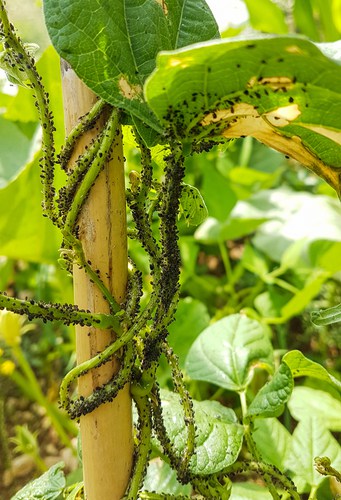
If you already have an infestation of blackflies, there are a few ways to get rid of them. First off, you can remove them by hand. They have soft bodies, so you can easily squish them between your fingers. You can also spray your plants with a hose and this will wash the bugs away. You have to be careful with this, though, because the power of your water stream can damage young plants.
Alternatively, you can make a mixture of warm water and liquid soap, then apply it to the plant with a spray bottle or a sponge. Similarly, insecticidal soap can be found at garden centres and sprayed on the plant too.
We try to avoid using pesticides where possible, especially on plants you eat, however, if you have a bad infestation then we recommend using a pesticide that is safe to use on vegetables, for example, the SBM Life Science Provanto Ultimate Fruit & Vegetable Bug Killer.
- Kills most common insect pests on a comprehensive range of fruit and vegetable plants such as apples and pears.
- Contact insecticide that can protect from pests for up to 2 weeks.
- Ideal for Grow your own.
- Kills and controls greenfly, blackfly, caterpillars, beetles, weevils, apple & pear suckers, capsids, sawfly, whitefly.
Natural methods include the use of neem oil. A small amount of neem oil (2oz) mixed well with one gallon of water can be sprayed on your plants to get rid of the infestation. You can also use essential oils and water, like peppermint, rosemary or thyme, each of which can be sprayed over the plant. These should be reapplied after it has rained, or once a week to make sure the infestation does not return.
Overall, prevention is the best way to keep your broad beans free from blackflies, however, once you see an infestation you need to treat it immediately. The longer the pests affect your plant, the weaker they become. Make sure your plants are given the best start possible with companion plants that lure the bugs away naturally.
Last update on 2025-04-10 / Affiliate links / Images from Amazon Product Advertising API





